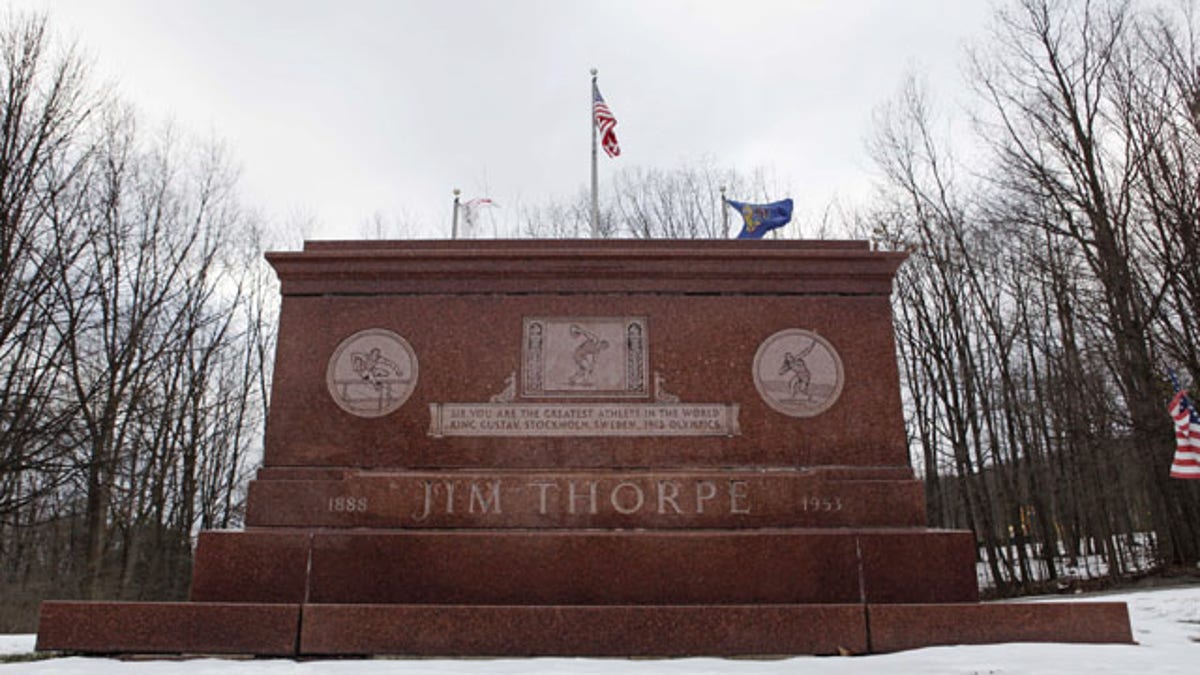
The tomb of Jim Thorpe is shown in Jim Thorpe, Pa. (AP Photo)
JIM THORPE, Pa. – The hand-lettered donation jar on Anne Marie Fitzpatrick's store counter says what many residents of this well-preserved Victorian-era town are thinking and feeling lately: "Keep Jim Thorpe in Jim Thorpe."
The surviving sons of the famous American Indian athlete have long fought to get the remains of their father moved from Jim Thorpe, Pa., to tribal lands in Oklahoma, where he was born, and they recently won a crucial legal victory that put them close to their goal.
But Jim Thorpe isn't letting its Olympian namesake go without a fight. Residents and business owners are helping to raise money for the town's appeal -- to be filed later this month -- saying they have honored, appreciated and respected a man long considered one of the 20th century's best athletes.
Hence the donation jar on the counter of Fitzpatrick's gift shop, prominently displayed between the cash register and a rack of cat figurines.
"We have no intention of letting him go," said Fitzpatrick, an organizer of the town's annual Jim Thorpe birthday bash. "There is a pride, and many, many people that you speak to as you go through the town share that pride."
Thorpe was a football, baseball and track star who won the decathlon and pentathlon in the 1912 Olympics, then later starred as the Indian in B-movies and struggled financially toward the end of his life. He died without a will in 1953 at age 64.
After Oklahoma's governor balked at the cost of a planned monument to the athlete, third wife Patricia had Thorpe's body removed in the midst of his funeral service and sent it to northeastern Pennsylvania, where she struck a deal with two merging towns -- Mauch Chunk and East Mauch Chunk -- to build a memorial and name the new town after him. His remains are kept in a mausoleum surrounded by statues and interpretive signage.
Thorpe's son, Bill Thorpe, of Arlington, Texas, said his father expressed a desire to be buried in Oklahoma.
"All this time we've wanted his body back because of the way that it was taken away from us," he said. "And we had no authority."
In April, U.S. District Judge Richard Caputo ruled in favor of Thorpe, his brother Richard, and the Sac and Fox tribe to which their father belonged, saying the town amounts to a museum under the 1990 Native American Graves Protection and Repatriation Act.
The borough council voted to appeal the ruling to the Philadelphia-based 3rd U.S. Circuit Court of Appeals, and written arguments are due Sept. 23. The town has found support from Jim Thorpe's grandsons, who say it has done right by him.
"The town has done nothing but honor and respect and love my grandpa," said John Thorpe, of Lake Tahoe, Calif. "The state of Oklahoma did not want to erect a mausoleum or do anything to honor him. They weren't willing to do what the town of Jim Thorpe did."
Thorpe said he was taking part in a sweat lodge ceremony in Texas three years ago when, unbidden, a medicine man told him his grandfather had made contact and said, "I am at peace, and I want no more pain created in my name."
He said that helped confirm his belief that his grandfather's tomb should remain where it is.
So what will happen if Thorpe's body is no longer there?
The borough on the western edge of Pennsylvania's Pocono Mountains is popular with tourists and frequently appears on lists of America's prettiest towns. But that is due largely to its vibrant main street, stunning mansions and location at the bottom of a steep gorge carved by the Lehigh River. Few come specifically to visit Thorpe's roadside memorial, and the town's economy certainly isn't dependent on its connection to the man.
But the psychological loss will be undeniable. The athlete who never set foot in the town named after him has become an important part of its identity. The high school's athletic teams are named, after all, the Olympians.
"Look, if it turns out that Jim Thorpe is going to be transported somewhere else, then let's accompany him and make it as graceful and honorable a transition as it could possibly be," said Dan Hugos, co-owner of the Mauch Chunk Opera House in Jim Thorpe.
"And let's shake the hands of the new people who are going to be caring for him. But we will still continue to do our part to remember who he was and remember his name."







































